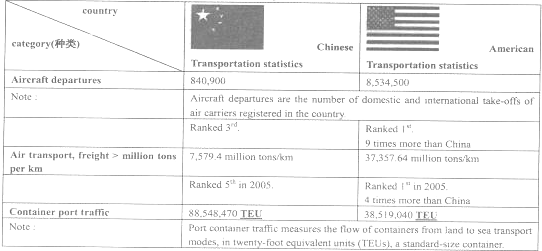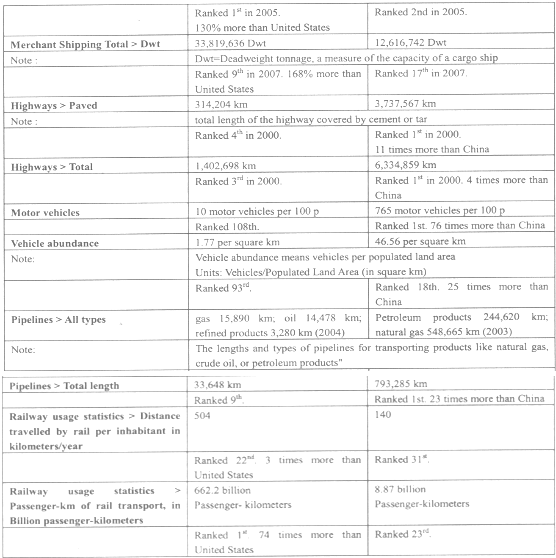题目内容
5.Transportation statistics:China vs United States SOURCE:World Development Indicators database ___.

46.What does the underlined TEU refer to?D
A.Container port traffic B.Sea transport modes
C.Twenty containers D.A standard-size container
47.America ranked first inB.
A.Motor vehicles and Vehicle abundance
B.Aircraft departures and Air transport,freight
C.Pipelines>Total length and Railway usage statistics
D.Container port traffic and Highways>Total
48.According to the statistics,China is better than America inDtransportation.
A.air and water B.highway and railway C.pipeline and highway D.water and railway
49 The items of the category listed here can be divided intoBgroups.
A.3 B.5 C.7 D.12.
分析 本文以表格的形式对比介绍了中美两国在运输方面的情况.这些方面包括:飞机起飞数量、空中货运、集装箱港口运输、商船、高速公路、管道、铁路和水运.
解答 DBDB
46 D 细节理解题.根据本表格划线字母是在集装箱港口运输一列,根据本列注释(note)可知TEU是指a standard-size container,故选D.
47 B 细节理解题.题目中是找美国排名第一的交通方式,根据表格的整体内容可以很明显的找到:飞机起飞数量和空中货运运输名列第一,结合具体的选项,故选B.
48 D 分析判断题.在对表格信息的整体理解的基础上,结合题干信息可知中国比美国强的输运方面应该在:水运和铁路方面,结合选项,故选D.
49 B 分析判断题.根据表格种类信息中的理解可以把运输大致化为:空中运输、海运、公路运输、管道运输、水运5种大体类型,故选B.
点评 本题通过表格的方式,来展示了中美在运输的不同方面的差别.本篇的细节分析题难度较小,在理解文本的基础之上可以很容易找到细节说明,从而得出正确答案;在分析判断题中,要通过分析总结把运输项目分为几个大类,根据文中语意和日常知识可以得出结论.

练习册系列答案
相关题目
8.I was invited to attend a presentation at the Kentucky School.That evening I found gratitude(感恩)had amazing (16)D to change our attitude…and our life.
The young musician Mr Patrick was (17)A onto the stage in his wheelchair and began to play the piano.His fingers danced across the keys as he (18)C beautiful music.He then began to sing as he played,and it was wonderful.But what shocked me most was his (19)B smile.
Patrick was born with no eyes and an illness in his legs,which (20)D him lame for life.However,as a child,he was (21)A with artificial eyes and placed in a wheelchair.Before his first (22)B,he discovered the piano.When his mom hit any note on the piano,and within one or two (23)C he'd get it.By his second birthday,he was playing"Twinkle,Twinkle,Little Star".His father was (24)D."We might not play baseball,bur we can play music together."
When Patrick was at the University of Louisville,his father(25)C classes with him.He was also a part of 214-member marching band!He was blind,wheelchair-bound trumpet player; and he and his father did it together.His father(26)A the night shift in order to accompany his daytime band practice.Patrick says,"My father is my (27)B.
But even more than his (28)B musical talent,it was Patrick's attitude of gratitude"that(29)A my soul.On stage,between songs,he talked to the audience about his life and about how(30)C he was with a great father.When his performance was over,Patrick and his father were on the stage together.The crowed rose to their feet and (31)Afor over five minutes.
We all face misfortune in our lives.(32)C,it's not the hardship but how we (33)Bto it that will determine the joy and happiness in our lives.During (34)C times,do we spend too much time feeling (35)B for ourselves,or can we,with gratitude,learn how to dance in the rain?
The young musician Mr Patrick was (17)A onto the stage in his wheelchair and began to play the piano.His fingers danced across the keys as he (18)C beautiful music.He then began to sing as he played,and it was wonderful.But what shocked me most was his (19)B smile.
Patrick was born with no eyes and an illness in his legs,which (20)D him lame for life.However,as a child,he was (21)A with artificial eyes and placed in a wheelchair.Before his first (22)B,he discovered the piano.When his mom hit any note on the piano,and within one or two (23)C he'd get it.By his second birthday,he was playing"Twinkle,Twinkle,Little Star".His father was (24)D."We might not play baseball,bur we can play music together."
When Patrick was at the University of Louisville,his father(25)C classes with him.He was also a part of 214-member marching band!He was blind,wheelchair-bound trumpet player; and he and his father did it together.His father(26)A the night shift in order to accompany his daytime band practice.Patrick says,"My father is my (27)B.
But even more than his (28)B musical talent,it was Patrick's attitude of gratitude"that(29)A my soul.On stage,between songs,he talked to the audience about his life and about how(30)C he was with a great father.When his performance was over,Patrick and his father were on the stage together.The crowed rose to their feet and (31)Afor over five minutes.
We all face misfortune in our lives.(32)C,it's not the hardship but how we (33)Bto it that will determine the joy and happiness in our lives.During (34)C times,do we spend too much time feeling (35)B for ourselves,or can we,with gratitude,learn how to dance in the rain?
| 16.A.knowledge | B.quality | C.wisdom | D.power |
| 17.A.rolled | B.held | C.allowed | D.dragged |
| 18.A.wrote | B.provided | C.made | D.gave |
| 19.A.strange | B.magic | C.bitter | D.friendly |
| 20.A.took | B.led | C.forced | D.left |
| 21.A.fitted | B.concerned | C.associated | D.filled |
| 22.A.place | B.birthday | C.performance | D.attempt |
| 23.A.memories | B.worda | C.tries | D.notes |
| 24.A.confused | B.amused | C.interested | D.overjoyed |
| 25.A.listed | B.found | C.attended | D.organized |
| 26.A.worked | B.found | C.refused | D.canceled |
| 27.A.dream | B.hero | C.music | D.song |
| 28.A.unbearable | B.unbelievable | C.unconditional | D.unreasonable |
| 29.A.touched | B.calmed | C.freed | D.felt |
| 30.A.satisfied | B.concerned | C.blessed | D.laughed |
| 31.A.cheered | B.whispered | C.shouted | D.laughed |
| 32.A.Therefore | B.Otherwise | C.However | D.Besides |
| 33.A.see | B.react | C.agree | D.put |
| 34.A.happy | B.modern | C.tough | D.usual |
| 35.A.great | B.sorry | C.hopeful | D.proud |
17.假设你是李津.下文节选自你的美国朋友Harry的来信,请就信中提到的问题给他写一封回信.(词数不少于100)
.
| …Have you ever thought what you are going to do in the future?As for me,I really don't know what career to choose although my parents say it's time I made a choice.What kind of job would youprefer to do?Have you asked your parents for advice?Would you like to follow in their footsteps?Anyway,we've got some time.Let me know what you think about it. |